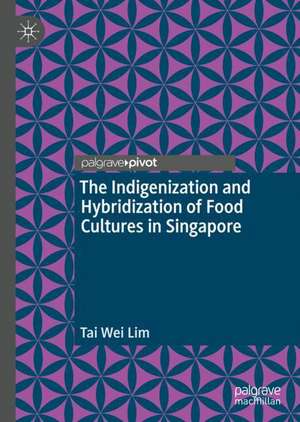The Indigenization and Hybridization of Food Cultures in Singapore
Autor Tai Wei Limen Limba Engleză Hardback – 16 iul 2019
Preț: 384.31 lei
Nou
Puncte Express: 576
Preț estimativ în valută:
73.54€ • 80.13$ • 61.97£
73.54€ • 80.13$ • 61.97£
Carte tipărită la comandă
Livrare economică 23 aprilie-07 mai
Preluare comenzi: 021 569.72.76
Specificații
ISBN-13: 9789811386947
ISBN-10: 9811386943
Pagini: 133
Ilustrații: XXXI, 111 p. 104 illus.
Dimensiuni: 148 x 210 mm
Greutate: 0.33 kg
Ediția:1st ed. 2019
Editura: Springer Nature Singapore
Colecția Palgrave Pivot
Locul publicării:Singapore, Singapore
ISBN-10: 9811386943
Pagini: 133
Ilustrații: XXXI, 111 p. 104 illus.
Dimensiuni: 148 x 210 mm
Greutate: 0.33 kg
Ediția:1st ed. 2019
Editura: Springer Nature Singapore
Colecția Palgrave Pivot
Locul publicării:Singapore, Singapore
Cuprins
Part I.- 1. Introduction.- 2. Food Vessels: A Brief Historical Survey of Ceramics Use for Food Consumption in Singapore’s Hawker Centres and Coffee Shops (kopitiams).- 3. Diversity in Southeast Asian Serving Vessels.- 4. Late Modernity: Food-Serving Vessels Used in the Mid-Twentieth century.- Part II. - 5. Promoting Singapore-Japan Ties Through the Soft Cultural Power of Food Diplomacy: The Hybridization, Cross-Pollination and Indigenization of Contemporary Japanese Food Culture in Singapore.- 6. The Korean Wave in Singapore’s Multi-cultural Food Scene: Indigenization, Localization, Hybridization and Cross-Pollination.- Part III.- 7. Conclusion.
Notă biografică
Tai Wei Lim is a Senior Lecturer at the Singapore University of Social Sciences (SUSS) and a Senior Research Fellow adj. at the National University of Singapore (NUS) East Asian Institute (EAI). He teaches world history and East Asian history-related courses at the SUSS and researches on heritage issues as well as industrial technological changes. He has also done research on the ceramics industries and mass production in Jingdezhen (China), Arita (Japan), Yingge (Taiwan) and urban pottery clusters in Hong Kong. He has an interest in the history of export porcelain wares from Jingdezhen/Arita.
Textul de pe ultima copertă
This pivot considers the use of porcelain vessels within multi-dialect cultural spaces in the consumption of cooked food in Singapore. In a place of ubiquitous hawker centres and kopitiams (coffee shops), the potteries used to serve hawker foods have a strong presence in the culinary culture of Singaporeans. The book looks at the relationship between those utensils, the food/drinks that are served as well as the symbolic, historical, socio-cultural and socioeconomic implications of using different kinds of porcelain/pottery wares. It also examines the indigenization of foreign foods in Singapore, using two case studies of hipster food – Japanese and Korean. While authentic Japanese and Korean cuisines find resonance amongst the youths of East Asia, some of them have adapted hybrid local features in terms of sourcing for local ingredients due to costs and availability factors. The book considers how these foods are hybridized and indigenized to suit local tastes, fashion and trends, andoffers a key read for East Asian specialists, anthropologists and sociologists interested in East Asian societies.
Caracteristici
Examines multi-dialect cultural spaces in the consumption of cooked food in Singapore Considers the indigenization of foreign foods in Singapore, using two case studies of hipster food – Japanese and Korean Studies the processes of hybridization and indigenized to suit local tastes, fashion and trends
